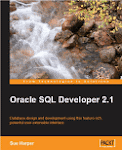I wrote SQL Developer 2.1 while the product was under development. As with all features in products, there is no guarantee that a feature will make a release until production, so it can be a nerve wracking process, writing, while things change as you write. The UI is often the most fluid and so screen shots and menus need to be done as close to the release of the product as possible. If you write a book after production you don't have the same problem, you just have to face the fact that in the IT world that if you do that, chances are that as your book is published, another, later release of the product is also published! It's a game of catchup. Regrettably, one of the features that I think is a killer feature in SQL Developer did not make it into that book. Unit Testing was still under development as I was writing the book and the time required between writing and production of the book and the product was too great a gap.
All is not lost!
I was recently invited to write a single chapter for "Expert PL/SQL Practices". A collaboration is great, because you only need to focus on one chapter, it's also harder to do, because styles vary and each author may have a different audience in mind. So who ultimately buys the book is up for grabs. My chapter in the book is very much in the same style of my SQL Developer 2.1 book, (because that's how I write) and covers PL/SQL Unit Testing. The book is available from Apress or Amazon and should be on the shelves soon.
Control your SQLcl MCP server database access
5 months ago







2 comments:
Oracle Developer 3.0 do not work right with OS OpenVMS.
I.E.Datafile: DISK:[ORACLE.ORADATA]USER.DBF
You should log issues about the products on the SQL Developer Forum on the oracle Technology Network.
Sue
Post a Comment